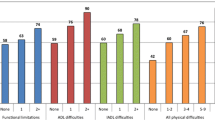Abstract
This study examined family support, financial needs, and health care needs of 100 elderly persons in a rural county in China. Data revealed that immediate family members helped elderly persons with activities of daily living and instrumental activities of daily living, and that adult children also provided financial assistance to most of the elderly. However, only eight percent of the elderly persons reported that they had adequate financial resources. In the four villages surveyed, collective health care systems had collapsed in the early 1980's. Due to high costs of health care and the absence of government support, almost two thirds of the elderly persons had unmet needs for health care. In addition, elderly persons who reported poor health were more likely to have unmet financial and health care needs.
Similar content being viewed by others
References
Campbell, R. T. (1992). Longitudinal research. In E. F. Borgatta & M. L. Borgatta (eds.), Encyclopedia of Sociology (pp. 1146–1158). New York: Macmillan.
Chen, S. (1996). Social policy of the economic state and community care in Chinese culture. London: Averbury.
Chen, P. C. & Tuan, C. H. (1983). Primary health care in rural China: Post-1978 development, Social Science & Medicine 17: 1411–1417.
Cheung, P. L. (1988). The best of times, the worst of times: Growing old in Asia. Paper presented at the Annual Meeting of the Gerontological Society of America.
China National Committee on Aging (1989). Population aging in China. Paper presented at the Asian Population Study Series. Bangkok, Thailand: United Nations.
China Research Center on Aging (1992). Survey data on China support system for elderly. Beijing, PR China: China Research Center on Aging.
Cretin, S., Williams, A. P., Cu, X. & Shi, Y. (1990). Modeling the effect of insurance on health expenditures in the People' Republic of China, Journal of Health Services Research 25: 668–685.
Davis-Friedmann, D. (1991). Long lives: Chinese elderly and communist revolution. Stanford, CA: Stanford University.
Fei, H. (1989). Rural development in China: Prospect and retrospect. Chicago, IL: The University of Chicago.
Fillenbaum, G. (1988). Multidimensional functional assessment of older adults: The Duke older Americans resources and services procedures. Hillsdale, NJ: Erlbaum.
Georage, L. (1994). Multidimensional assessment instruments: Present status and future prospects, Annual Review of Gerontology and Geriatrics 14: 353–374.
Gu, X. Y., Bloom, G., Tang, S. G. & Zhu, Y. G. (1993). Financing health care in rural China: Preliminary report of a nationwide study, Social Science Medicine 36: 385–391.
Harper, S. (1992). Caring for China' aging population: The residential option – A case study in Shanghai, Journal of Aging and Society 12: 157–184.
Hong, G. (1996). Aging of population: Trends and countermeasures, Beijing Review 39: 12–14.
Ikels, C. (1990). Family caregivers and the elderly in China. In D. E. Biegel & A Blum (eds.), Aging and caregiving theory, research, and policy (pp. 270–284). Newbury Park, CA: Sage.
Ikels, C. (1993). Setting accounts: The intergenerational contract in an age of reform. In D. Davis & S. Harrell (eds.), Chinese families in the post-Mao era (pp. 307–377). Berkeley: University of California.
Jiang, L. (1995). Changing kinship structure and its implications for old-age support in urban and rural China, Population Studies 49: 127–145.
Legislative Affairs Commission of the Standing Committee of the National People' Congress of the People' Republic of China (1997). Guaranteeing the rights of older people: China takes a great leap forward, Global Aging Report 2: 3.
Li, C. R. (1992). A study of China' population. Beijing, P. R. China: Foreign Language.
Liang, J. & Gu. S. (1989). Long-Term care for the elderly in China. In T. Schwab (ed.), Caring for an aging world: International models for long-term care, financing, and delivery (pp. 265–287). New York: McGraw-Hill.
Martin, L. G. (1988). The aging of Asia, Journal of Gerontology 43: S99–113.
Ministry of Public Health (1986). Public health in the People' Republic of China. Beijing, P R China: People' Medical Publishing.
Olsen, P. (1986/1987). A model of elderly care in the People' Republic of China, International Journal of Aging and Human Development 24: 279–300.
Rubin, A. & Babbie, E. (1993). Research methods for social work (2nd. edn). Pacific Grove, CA: Brooks/Cole.
Shi, L. (1994). Elderly support in rural and suburban villages: Implications for future support system in China, Social Science & Medicine 39: 265–277.
Simmons, L.W. (1945). The role of the aged in primitive society. London: Oxford University.
Tu, E. J., Liang, J. & Li, S. (1989). Mortality decline and Chinese family structure: Implications for old age support, Journal of Gerontology 44: S157–168.
Tracy, M. B. (1991). Social policies for the elderly in the third world. Westport, CT: Greenwood.
Wolinsky, F. D. & Johnson, R. J. (1992). Perceived health status and mortality among older men and women, Journal of Gerontology 47: S304–312.
World Bank (1986). China: The health sector. New York: United Nations.
World Bank (1992). China: Long-term issues and options in health transition. New York: United Nations.
Wu, F. (1996). Rural endowment insurance system established, Beijing Review 39: 18–20.
Yang, H. Q. (1996). The distributive norm of monetary support to older parents: A look at a township in China, Journal of Marriage and the Family 58: 404–415.
Zeng, Y. (1991). Family dynamics in China: A life table analysis. Madison, WI: University of Wisconsin.
Zhu, B. X. (1991). Rising costs may end free health care system, China Daily, 25 November 1991, p. 3. ??
Author information
Authors and Affiliations
Rights and permissions
About this article
Cite this article
Li, H., Tracy, M.B. Family support, financial needs, and health care needs of rural elderly in China: A field study. Journal of Cross-Cultural Gerontology 14, 357–371 (1999). https://doi.org/10.1023/A:1006607707655
Issue Date:
DOI: https://doi.org/10.1023/A:1006607707655




